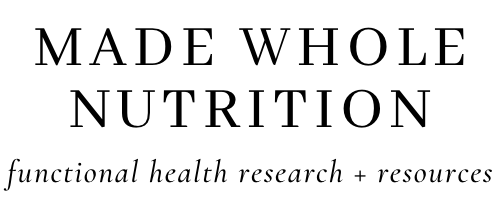3 Reasons Why Relationship-Based Health Education MUST be the Future of Healthcare
I know am preaching to the choir when I say our current healthcare system is broken (or as some call it, the “sickcare” system).
While modern allopathic medicine is necessary for addressing acute health issues (like when I break my leg), it fails to provide clear solutions for addressing the critical rising rates of obesity, metabolic syndrome, mental health issues, infertility, and other chronic diseases.
If it were as simple as telling someone to just “lose weight”, “eat better”, or “exercise more”, we would not be facing this chronic disease epidemic.
Something is not working.
Despite the abundance (or one might argue, over-abundance) of health information available on the internet and social media, we are still sick.
And preventative health is not rocket-science; in fact, it is often very intuitive: eat more vegetables, move your body, prioritize sleep, reduce toxins…
However, the disconnect still exists because most health education resources tell WHAT and WHY, but few provide HOW.
The problem is not lack of information, it is lack of implementation.
This is precisely why relationship-based health education MUST be the future of health care.
We need a model in which health coaching takes the lead in preventive and chronic disease care.
Here are three reasons why relationship-based health education is a game-changer:
1. Cuts through information overload
As you know, there is so much to know about health and nutrition, perhaps more than a person could know in a lifetime.
The average person does not have the time, ability, or interest to sift through all that information.
This is why fad diets are attractive: they provide clear, black-and-white guidelines for the person who does not have time or brainspace to understand the nuances.
However, when a health practitioner has solid background knowledge and expertise, they can SELECTIVELY COMMUNICATE what each individual person needs to know (and perhaps more importantly, filter out what they don't).
2. Provides an external perspective
An attentive health practitioner can see the 30,000 foot view of an individual’s health situation.
Just as you would call a friend for third-party advice, an external perspective is necessary for understanding the entire scope of whole-person health.
This perspective is impossible for a person to have for themself (which is why health practitioners cannot heal themselves).
This is my experience: no matter how knowledgeable or skilled I may be, I CANNOT HEAL MYSELF.
In addition, another person can help see solutions, set goals, and provide accountability.
3. Nurtures relationship
Relationship is the most life-changing aspect of this approach to health education.
All the information in the world cannot rival the healing power of an intentional relationship.
True healing is a process of restoration, it is a process of being made whole (ha, get the reference?).
When we look at nature, everything is interconnected via relationships.
Therefore, natural, whole-person health HAS to involve the restoration of relationships (on every level).
Relationship-based health education means walking with another person during their health journey.
The most valuable thing you can provide for your patient is not a clinical assessment nor a supplement protocol, it is a supportive relationship.
And that is a radical future for healthcare.


